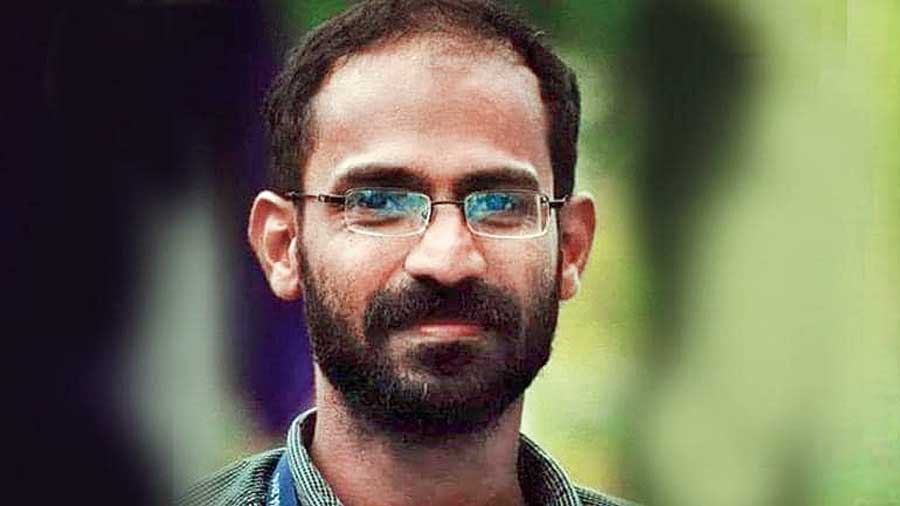
"I am out after a lot of fight": Siddique Kappan after his release on bail

Kerala journalist Siddique Kappan, who was incarcerated for two years without trial, walked out of jail on Thursday (February 2) a free man, a day after the sureties required for his bail were submitted in court.
Kappan was arrested in October 5, 2020 while he was on his way to Hathras to report on the alleged gang-rape of a young woman whose death had sparked nationwide protests. But later, he was charged under the dreaded UAPA and a money laundering case was also slapped against him.
Two sureties of ₹1 lakh each were submitted on Wednesday in the special PMLA (Prevention of Money Laundering Act) court in Lucknow. Kappan was released from jail around 9.15 am, the jailor of Lucknow district jail Rajendra Singh told PTI.
“I struggled,” Kappan admitted minutes after he walked out to camera crews, a small curious crowd – and to his wife and teen son, who were waiting patiently. His family had been waiting for more than two years since he was imprisoned on his way to Hathras to cover the gang-rape of a Dalit girl.
“It has been 28 months. I am out after a lot of fight. I am happy,” he said.
And he told NDTV, “This is half-baked justice. Journalism is not a crime. I will continue my fight against draconian laws. They kept me in jail even after I got bail…28 months after a long fight. I don’t know who’s benefiting from my being in jail. These two years were very tough, but I was never afraid,” he told NDTV after his release from the Lucknow jail.
Also read: Lucknow court signs order to release Siddique Kappan, to walk out of jail soon
Speaking to PTI, the journalist added, “I am coming to Delhi. I have to stay there for six weeks.” Asked about the purpose of his visit to Hathras in 2020, Kappan told the assembled reporters that he had gone there for “reporting”. About those who had accompanied him, he said they were students.
Kappan and three others were arrested in October 2020 while they were going to the Uttar Pradesh town where a Dalit woman died allegedly after being gang-raped. They were accused of trying to instigate violence over the death of the Hathras woman.
To questions about recoveries made from him, Kappan told the media, “Nothing… I had only a laptop and mobile.” Asked about reports that some objectionable materials were also found on him, he said, “Two pens and a notepad.” Kappan denied any involvement in terror acts or financing.
Also read: I struggled, says Siddique Kappan after coming out of jail
Police had alleged that Kappan had links with the now-banned Popular Front of India and he was charged under the Unlawful Activities (Prevention) Act (UAPA) and sections of the Indian Penal Code.
In his two and a half years in jail, his mother died. “Her name was Kadijah. She is not there to see Kappan coming home,” his wife Raihana told PTI.
“The Supreme Court granted bail in the UAPA case and his innocence was revealed. Two and a half years is not a short time. We have experienced a lot of pain and suffering. But I am happy that justice, though belated, has been served,” she said, stressing that Kappan is a media person. The couple has three children, Muzammil (19), Zidhan (14) and Mehnaz (nine).
“Our children are waiting to welcome him home. Their happiness was taken away. Can they forget their father? They are proud to say that Siddique Kappan, a journalist, is their father.”
According to Kappan’s lawyer Mohamed Dhanish KS, the journalist had been lodged in the Mathura and Lucknow district jails and had been out twice – once when he got COVID and was admitted at AIIMS, Delhi, and the second time to meet his ailing mother.
Last September, the Supreme Court granted him bail after observing that no formal charges were filed against him and a document named “Toolkit” recovered by the state police only propagated a call for justice in the rape case. But he continued to be in jail because of the money laundering case filed by the Enforcement Directorate.
Though, he had bail in the money laundering case as well three months later, his release was held up due to multiple bureaucratic lapses.
In the Reporters Without Borders press freedom ranking, India has dropped ten places to 150 out of 180 surveyed countries since Prime Minister Narendra Modi government assumed power in 2014. Nine other journalists are still languishing in prison.

